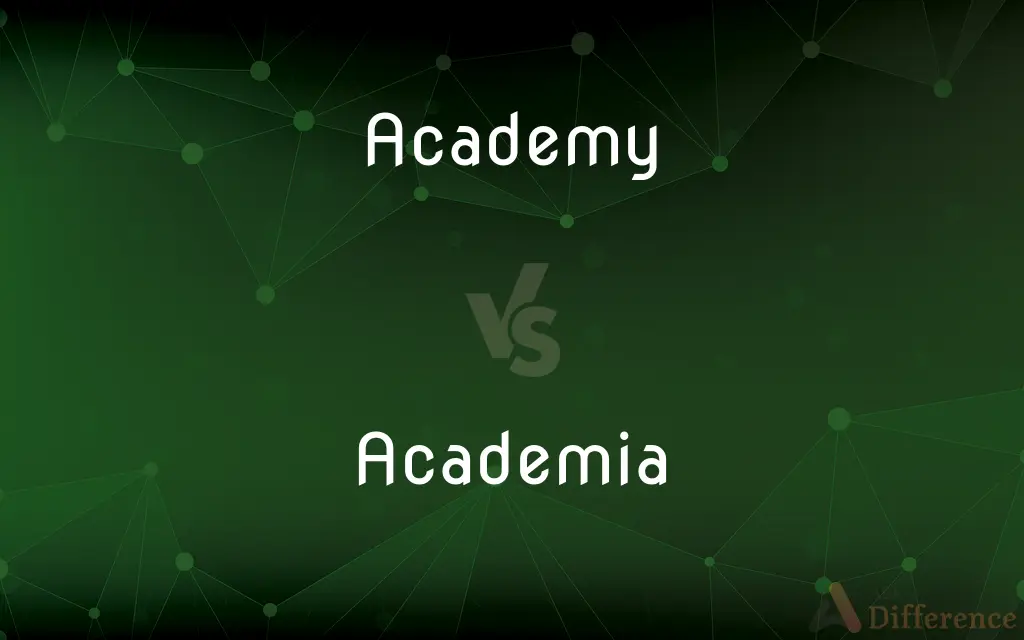Academy vs. Academia — What's the Difference?
By Tayyaba Rehman & Fiza Rafique — Updated on March 17, 2024
An academy is an institution for learning or research, often focusing on specific subjects, while academia refers to the collective world of teaching and research across all academic disciplines.

Difference Between Academy and Academia
Table of Contents
ADVERTISEMENT
Key Differences
Academies are institutions that provide education or training in specialized fields or general subjects, offering structured courses and programs. They can be schools, colleges, or professional institutions that focus on specific areas such as arts, sciences, or military training. Whereas, academia encompasses the broader scholarly community involved in higher education and research. It represents the institutional and cultural aspects of scholarship, including universities, colleges, and research institutes, where knowledge is created, taught, and disseminated across a wide range of disciplines.
While academies often refer to single institutions with a focused mission, academia represents the global network of scholars, researchers, and educators dedicated to academic pursuits. Academies play a role within academia by contributing to the education and training of future scholars and professionals. On the other hand, academia at large supports a diverse ecosystem of knowledge production and dissemination, fostering collaboration and innovation across disciplines.
Academies can be seen as the building blocks of academia, providing the educational foundation and specialized knowledge that fuel academic research and teaching. They often maintain autonomy in their curricular decisions and methodologies, tailoring their offerings to the needs of their students and fields. Conversely, academia operates on a more collective level, governed by academic standards and practices that ensure the integrity and quality of scholarly work across institutions and disciplines.
The relationship between academies and academia is symbiotic, with academies nurturing individual talents and academia providing a framework for their contribution to the collective knowledge pool. Academies focus on the practical application of knowledge and skills, preparing individuals for professional or academic careers. Academia, in contrast, is concerned with the advancement of knowledge itself, promoting theoretical exploration and interdisciplinary research.
Academies are characterized by their specific educational or research objectives, aiming to excel in particular areas of study or practice. This focused approach allows for in-depth exploration and mastery of subjects. Academia, however, values breadth as well as depth, encouraging a holistic understanding of knowledge and its interconnections, fostering a culture of lifelong learning and intellectual curiosity.
ADVERTISEMENT
Comparison Chart
Definition
A specialized institution for learning or research
The collective world of teaching and research
Focus
Specific subjects or fields
All academic disciplines
Purpose
Education, training, or research in specific areas
Advancement of knowledge, education, and research
Constituents
Students, educators, researchers in specific fields
Scholars, researchers, educators across disciplines
Cultural/Institutional
Individual institutions with focused missions
Global scholarly community and its cultural aspects
Compare with Definitions
Academy
A place of study or training in a special field.
The naval academy trains officers for the navy.
Academia
The collective institutions of higher education and research.
Academia plays a crucial role in technological advancement.
Academy
An institution for higher learning with autonomy to award degrees.
The military academy is renowned for its rigorous academic and physical programs.
Academia
The life, members, or world of teachers, schools, and education.
After decades in academia, he retired as a respected professor.
Academy
A society or institution of distinguished scholars and artists or scientists.
She was elected into the national academy of sciences.
Academia
The environment or community concerned with the pursuit of research, education, and scholarship.
She thrived in academia, contributing significantly to her field.
Academy
An institution for secondary education, sometimes with a specific focus.
The academy specializes in science and technology.
Academia
A culture characterized by the pursuit of learning and scholarly interests.
Academia often debates the balance between teaching and research.
Academy
A school for training in specific arts or skills.
The dance academy hosts annual performances by its students.
Academia
The system or milieu of university and college education.
Moving from industry to academia, she brought practical experience to her teaching.
Academy
An academy (Attic Greek: Ἀκαδήμεια; Koine Greek Ἀκαδημία) is an institution of secondary or tertiary higher learning, research, or honorary membership. The name traces back to Plato's school of philosophy, founded approximately 385 BC at Akademia, a sanctuary of Athena, the goddess of wisdom and skill, north of Athens, Greece.
Academia
The environment or community concerned with the pursuit of research, education, and scholarship
He spent his working life in academia
Academy
A place of study or training in a special field
A police academy
Academia
The academic community; academe.
Academy
A society or institution of distinguished scholars and artists or scientists that aims to promote and maintain standards in its particular field
The Royal Academy of Arts
Academia
(collective) The scientific and cultural community engaged in higher education and research, taken as a whole.
Academia continues to provide scientific education, despite attempts to turn it into a system of professional schooling.
Academy
A school for special instruction.
Academia
Continuous study at higher education institutions; scholarship.
Not every university graduate wishes to pursue academia.
Academy
A secondary or college-preparatory school, especially a private one.
Academia
The academic world
Academy
The academic community; academe
"When there's moral leadership from the White House and from the academy, people tend to adjust" (Jesse Jackson).
Academy
Higher education in general. Used with the.
Academy
A society of scholars, scientists, or artists.
Academy
Plato's school for advanced education and the first institutional school of philosophy.
Academy
Platonism.
Academy
The disciples of Plato.
Academy
The garden where Plato taught.
Academy
Plato's philosophical system based on skepticism; Plato's followers.
Academy
An institution for the study of higher learning; a college or a university; typically a private school.
Academy
A school or place of training in which some special art is taught.
The military academy at West Point; a riding academy; the Academy of Music.; a music academy; a language academy
Academy
A society of learned people united for the advancement of the arts and sciences, and literature, or some particular art or science.
The French Academy; the American Academy of Arts and Sciences; academies of literature and philology.
Academy
(obsolete) The knowledge disseminated in an Academy.
Academy
Academia.
Academy
A body of established opinion in a particular field, regarded as authoritative.
Academy
A school directly funded by central government, independent of local control.
Academy
A garden or grove near Athens (so named from the hero Academus), where Plato and his followers held their philosophical conferences; hence, the school of philosophy of which Plato was head.
Academy
An institution for the study of higher learning; a college or a university. Popularly, a school, or seminary of learning, holding a rank between a college and a common school.
Academy
A place of training; a school.
Academy
A society of learned men united for the advancement of the arts and sciences, and literature, or some particular art or science; as, the French Academy; the American Academy of Arts and Sciences; academies of literature and philology.
Academy
A school or place of training in which some special art is taught; as, the military academy at West Point; a riding academy; the Academy of Music.
Academy
A secondary school (usually private)
Academy
An institution for the advancement of art or science or literature
Academy
A school for special training
Academy
A learned establishment for the advancement of knowledge
Common Curiosities
Is academia limited to universities and colleges?
While universities and colleges are central to academia, it also includes research institutes and any other organizations dedicated to higher education and scholarly research.
Do academies only focus on arts and sciences?
No, academies can focus on a wide range of subjects, including arts, sciences, technology, military training, and more, depending on their specific mission and goals.
How does one contribute to academia?
Individuals contribute to academia by engaging in teaching, research, publishing scholarly work, participating in academic conferences, and collaborating in scholarly communities.
Can someone be part of academia without working at a university or college?
Yes, individuals working in research institutes, government agencies, and industry positions contributing to research and scholarship are also considered part of academia.
What is the main difference between an academy and academia?
An academy is a specific institution for learning or research, focusing on certain fields, whereas academia refers to the entire scholarly community and institutions involved in education and research across disciplines.
Are all academies private institutions?
Academies can be both private and public institutions, depending on their funding, governance, and specific focus.
Do academies award degrees?
Some academies, especially those focused on higher education, can award degrees, while others may offer certificates or diplomas for specialized training.
Can academies be part of academia?
Yes, academies are part of academia as they contribute to the broader educational and research missions by focusing on specialized training and scholarship.
Can academies be online?
Yes, with advancements in technology, many academies offer online programs and courses, extending access to specialized education and training to a wider audience.
What challenges does academia face today?
Academia faces challenges such as funding constraints, debates over the balance between teaching and research, the need for diversity and inclusion, and adapting to changes in technology and societal needs.
How does academia influence industry and policy?
Academia influences industry and policy through research and innovation, providing evidence-based insights, training skilled professionals, and contributing to technological and social advancements.
Is a career in academia only for professors and researchers?
While professors and researchers are prominent roles, careers in academia also include administrative, technical, and support positions that contribute to the educational and research missions.
How does one become a member of an academy?
Membership in an academy often requires achieving certain academic or professional milestones, such as earning advanced degrees, demonstrating expertise in a field, or being recognized for contributions to a discipline.
What is the role of academia in society?
Academia plays a crucial role in advancing knowledge, fostering innovation, educating future generations, and contributing to the cultural and intellectual growth of society.
What are the benefits of attending an academy?
Attending an academy offers specialized education or training, preparing individuals for careers in specific fields or disciplines, often with a focus on excellence and mastery.
Share Your Discovery

Previous Comparison
Surface vs. Superficial
Next Comparison
Resin vs. AcrylicAuthor Spotlight
Written by
Tayyaba RehmanTayyaba Rehman is a distinguished writer, currently serving as a primary contributor to askdifference.com. As a researcher in semantics and etymology, Tayyaba's passion for the complexity of languages and their distinctions has found a perfect home on the platform. Tayyaba delves into the intricacies of language, distinguishing between commonly confused words and phrases, thereby providing clarity for readers worldwide.
Co-written by
Fiza RafiqueFiza Rafique is a skilled content writer at AskDifference.com, where she meticulously refines and enhances written pieces. Drawing from her vast editorial expertise, Fiza ensures clarity, accuracy, and precision in every article. Passionate about language, she continually seeks to elevate the quality of content for readers worldwide.
















































